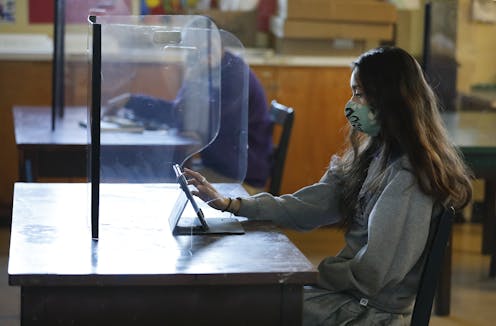Pandemic has teens feeling worried, unmotivated and disconnected from school
- Written by Leah M. Lessard, Postdoctoral Fellow at the Rudd Center for Food Policy & Obesity, University of Connecticut

When the COVID-19 pandemic started, many U.S. teens were more worried about the disruption to their education than the possibility of getting sick. A May 2020 survey of high school students found that they reported academics and work habits[1] to be among their biggest challenges, ahead of mental and physical health. Nearly three-quarters (72%) indicated they were “very much” concerned[2] with how COVID-19 would impact their school year.
As a researcher who studies adolescent development[3], I was interested in whether and how teens’ school stress changed as the pandemic dragged on. So during the fall of 2020, my colleague[4] and I surveyed adolescents about their academic concerns and the changes they noticed in school social dynamics.
Our study, published in School Psychology[5], revealed that some school challenges increased, while others stayed about the same.
Education concerns
The 452 adolescents, aged 11-17, that we surveyed reported that they still worried about how COVID-19 would impact their schoolwork. And concerns about academic motivation were most common. Teens most frequently worried about not being able to motivate themselves to do, or focus on, schoolwork.
These academic worries were elevated among older students who were further along in secondary school, for whom graduation and college planning are more imminent.
While our study did not collect academic achievement data, links between school stress and poorer academic outcomes[6] highlight the importance of alleviating students’ academic worries in order to reduce potential pandemic-related learning loss[7].
Less support from teachers
In the early months of the pandemic, nearly one in four teens[8] said they connected with teachers less than once a week after in-person school activities were canceled. We found this limited communication with teachers persisted into the 2020-2021 school year.
In fact, nearly 70% of the teens in our sample reported communicating less frequently with teachers since the start of the COVID-19 pandemic. Many also perceived a decline in academic and emotional support from teachers, reported by 61% and 48% of the sample, respectively.
Of course, it is critical to recognize how teachers’ lives have also been upended by the pandemic. Having to navigate family obligations, technology challenges[9], psychological strain[10] and COVID-19 health concerns, for example, may contribute to teacher burnout[11] and mental health declines[12].
Cyberbullying
Although school is a common setting for bullying[13], we found that distance learning did not necessarily give students a reprieve from being mistreated by peers. Teens in our sample reported that cyberbullying remained relatively consistent since the COVID-19 pandemic began.
In fact a notable proportion – one in three students – reported that cyberbullying “increased” and was “more of a problem” during this time period.
It is possible that these increases reflect increases in social media[14] use during the pandemic, given potential links between social media use and cyberbullying[15].
It is important to note that our study assessed only experiences of general cyberbullying. We believe attention toward teens’ online experiences of bias-based bullying is much needed. One study, conducted in the spring of 2020, found that nearly half[16] of Chinese American youth were targets of COVID-19-related racial discrimination online.
Back-to-school tips
To alleviate teens’ academic worries, schools can cultivate structure and routine for students[17] as they resume some normalcy.
Social connection and communication between students and teachers should be prioritized, including opportunities for students to express their worries early on. Meeting with guidance counselors for support at the outset of the upcoming school year may help students cope with the transition out of the pandemic.
With the switch back to classroom instruction, schools should also ensure that teachers have the resources they need, including clear administrative guidance, to support students and avoid burnout during this reintegration period.
To get teens excited about the upcoming school year, parents might encourage them to reconnect over the summer with classmates they may have lost touch with during the pandemic. Video chatting[18] with friends may help students reestablish social bonds and increase enjoyment of school once the academic year begins. After all, teens often report that they go to school to be with their friends[19], and such friendships can help them navigate academic demands and other school-related challenges.
References
- ^ academics and work habits (doi.org)
- ^ “very much” concerned (psycnet.apa.org)
- ^ researcher who studies adolescent development (scholar.google.com)
- ^ my colleague (hdfs.uconn.edu)
- ^ School Psychology (doi.org)
- ^ poorer academic outcomes (doi.org)
- ^ learning loss (www.pnas.org)
- ^ one in four teens (www.surveymonkey.com)
- ^ technology challenges (www.ijopr.com)
- ^ psychological strain (internal-journal.frontiersin.org)
- ^ teacher burnout (doi.org)
- ^ mental health declines (doi.org)
- ^ common setting for bullying (doi.org)
- ^ increases in social media (doi.org)
- ^ cyberbullying (www.sciencedirect.com)
- ^ nearly half (doi.org)
- ^ structure and routine for students (doi.org)
- ^ Video chatting (doi.org)
- ^ to be with their friends (doi.org)

















